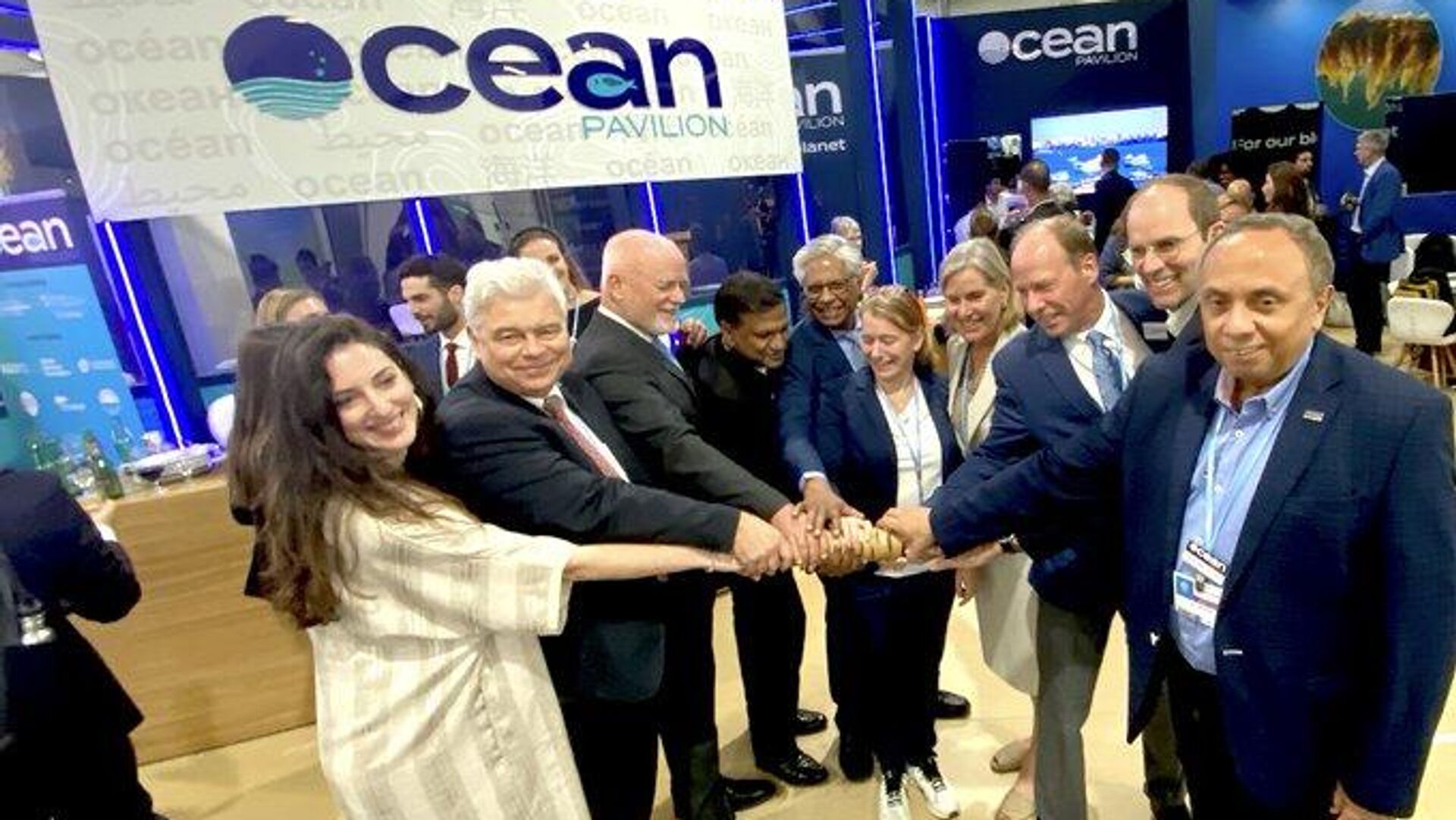https://sputniknews.in/20221213/over-90-of-marine-species-uncategorized-may-go-extinct-scientists-at-cop15-22010.html
Over 90% of Marine Species Uncategorized, May Go Extinct: Scientists at COP15
Over 90% of Marine Species Uncategorized, May Go Extinct: Scientists at COP15
Sputnik India
The UN’s Biodiversity Conference, also known as COP15, highlights the alarming destruction of nature due to human activity, as well as attempts at... 13.12.2022, Sputnik India
2022-12-13T07:07+0530
2022-12-13T07:07+0530
2022-12-13T07:07+0530
world news
south asia
https://cdn1.img.sputniknews.in/img/07e6/0c/09/23833_0:31:680:414_1920x0_80_0_0_a51b198c02171f93b9ab3b6f2b44c835.jpg
The international marine scientists, in a new policy brief presented at the UN Biodiversity Conference (COP15), have warned that more than 90 percent of marine species are undescribed and many may go extinct due to human activity before they are discovered.This loss of unique and potentially valuable genetic resources is affecting the global ecosystems essential to human food supplies and climate regulation, the policy says. The reason being, habitats for marine species are getting destructed and undergoing dramatic changes due to their exposure to pollution causing global warming, ocean acidification, and resource depletion.Back in 2019, due to deep-seabed mining, a rear scaly-foot snail, also known as Chrysomallon squamiferum, spotted in the Indian Ocean (east of Madagascar), became the first deep-sea species to be officially declared endangered.Marine scientists have said that for the effective conservation of both the species and the marine ecosystem, the first step is to have knowledge of deep-sea species biodiversity.The need of the hour is to have new research to fill a critical knowledge gap and hence, marine scientists have urged the global policy-makers to extend their support in developing international research strategies, infrastructure, cooperation, and exploration.“Deep-sea areas seem very distant and insignificant at first glance; it’s not immediately clear what this vast ecosystem and its inhabitants are doing for us,” Kaiser explains.During the 15th Conference of the Parties (COP15) to the United Nations Convention on Biological Diversity (CBD), governments from around the world have come together to set out new goals and develop an action plan for the conservation of nature over the next decade.
south asia
Sputnik India
feedback.hindi@sputniknews.com
+74956456601
MIA „Rossiya Segodnya“
2022
Sangeeta Yadav
https://cdn1.img.sputniknews.in/img/07e6/0c/0f/110602_0:0:641:640_100x100_80_0_0_c298016a79eb02ef8caa9d1f688c12a5.jpg
Sangeeta Yadav
https://cdn1.img.sputniknews.in/img/07e6/0c/0f/110602_0:0:641:640_100x100_80_0_0_c298016a79eb02ef8caa9d1f688c12a5.jpg
News
en_IN
Sputnik India
feedback.hindi@sputniknews.com
+74956456601
MIA „Rossiya Segodnya“
Sputnik India
feedback.hindi@sputniknews.com
+74956456601
MIA „Rossiya Segodnya“
Sangeeta Yadav
https://cdn1.img.sputniknews.in/img/07e6/0c/0f/110602_0:0:641:640_100x100_80_0_0_c298016a79eb02ef8caa9d1f688c12a5.jpg
marine species, extinct, discovered, scientists, cop15, international marine scientists, new policy, un biodiversity conference, genetic resources, global ecosystems, human food supplies, climate regulation, deep-sea animal species, threatened, extinction, habitats for marine species, pollution, global warming, ocean acidification, resource depletion, scaly-foot snail, chrysomallon squamiferum, deep-sea bed mining, effective conservation, marine ecosystem, biodiversity, conservation, stefanie kaiser, senckenberg research institute and natural history museum, frankfurt, new research, marine scientists, global policy-makers, international research strategies, infrastructure, cooperation, exploration, conference of the parties, united nations convention on biological diversity, cbd, government, conservation of nature,
marine species, extinct, discovered, scientists, cop15, international marine scientists, new policy, un biodiversity conference, genetic resources, global ecosystems, human food supplies, climate regulation, deep-sea animal species, threatened, extinction, habitats for marine species, pollution, global warming, ocean acidification, resource depletion, scaly-foot snail, chrysomallon squamiferum, deep-sea bed mining, effective conservation, marine ecosystem, biodiversity, conservation, stefanie kaiser, senckenberg research institute and natural history museum, frankfurt, new research, marine scientists, global policy-makers, international research strategies, infrastructure, cooperation, exploration, conference of the parties, united nations convention on biological diversity, cbd, government, conservation of nature,
Over 90% of Marine Species Uncategorized, May Go Extinct: Scientists at COP15
The UN’s Biodiversity Conference, also known as COP15, highlights the alarming destruction of nature due to human activity, as well as attempts at conservation.
The international marine scientists, in a new policy brief presented at the UN Biodiversity Conference (COP15), have warned that more than 90 percent of marine species are undescribed and many may go extinct due to human activity before they are discovered.
This loss of unique and potentially valuable genetic resources is affecting the global ecosystems essential to human food supplies and climate regulation, the policy says.
According to the experts, around 28,000 deep-sea animal species have been described and named. An estimated 2.2 million other marine species are undiscovered, some of which are thought to be threatened with extinction.
The reason being, habitats for marine species are getting destructed and undergoing dramatic changes due to their exposure to pollution causing global warming, ocean acidification, and resource depletion.
Back in 2019, due to deep-seabed mining, a rear scaly-foot snail, also known as Chrysomallon squamiferum, spotted in the Indian Ocean (east of Madagascar), became the first deep-sea species to be officially declared endangered.
Marine scientists have said that for the effective conservation of both the species and the marine ecosystem, the first step is to have knowledge of deep-sea species biodiversity.
“Conservation of deep-sea species found in ‘areas beyond national jurisdiction’ is particularly challenging. We know very little about them, and there is not yet an international framework to guide the implementation of conservation measures,” says the lead author of the brief, Stefanie Kaiser of the Senckenberg Research Institute and Natural History Museum, Frankfurt.
The need of the hour is to have new research to fill a critical knowledge gap and hence, marine scientists have urged the global policy-makers to extend their support in developing international research strategies, infrastructure, cooperation, and exploration.
“Deep-sea areas seem very distant and insignificant at first glance; it’s not immediately clear what this vast ecosystem and its inhabitants are doing for us,” Kaiser explains.
“The deep sea — defined as 200 to 11,000 metre depth and beyond — is the world’s largest habitat, covering more than half of earth’s surface. It is essential to global climate regulation by storing carbon dioxide and heat and by maintaining biodiversity,” Kaiser adds.
During the 15th Conference of the Parties (COP15) to the United Nations Convention on Biological Diversity (CBD), governments from around the world have come together to set out new goals and develop an action plan for the conservation of nature over the next decade.


